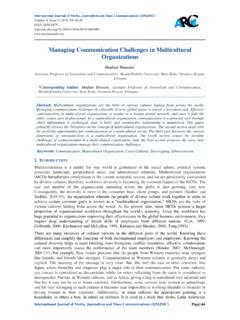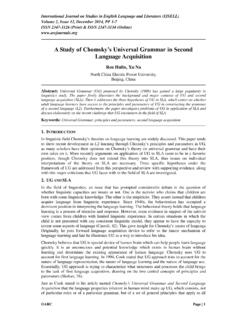Transcription of Understanding Critical Discourse Analysis in Qualitative …
1 International Journal of Humanities Social Sciences and Education (IJHSSE) Volume 1, Issue 7, July 2014, PP 104-113 ISSN 2349-0373 (Print) & ISSN 2349-0381 (Online) ARC Page 104 Understanding Critical Discourse Analysis in Qualitative Research Tebogo Mogashoa University of South Africa College of Education Department of Curriculum and Instructional Studies Unisa South Africa Abstract: This article explores Critical Discourse Analysis as a theory in Qualitative research. The framework of Analysis includes Analysis of texts, interactions and social practices at the local, institutional and societal levels. It aims at revealing the motivation and politics involved in the arguing for or against a specific research method, statement, or value. It draws on the necessity for describing, interpreting, analysing, and critiquing social life reflected in text by using Critical Discourse Analysis .
2 The article recognises that Human subjects use texts to make sense of their world and to construct social actions and relations in the labour of everyday life while at the same time, texts position and construct individuals, making available various meanings, ideas and versions of the world (Lucke 1996:12). Drawing from literature, this study will explore programmes, various forms of Critical Discourse Analysis , principles as well as advantages and disadvantages of using this theory in Qualitative research. Keywords: Critique, Discourse , Analysis , framework, conversations, concepts. 1. INTRODUCTION Anyon (2009:3) argues that theory and educational research bridges the old-age theory divide by demonstrating how researchers can use Critical theory to determine appropriate empirical research strategies, and extend the analytical, Critical and sometimes emancipator power of data gathering and interpretation.
3 Dressman (2008:9) further states that theory circumscribes methods of thinking about educational problems and inhibits creativity among researchers, policy makers and teachers. According to Suppes (1974:4), there are five kinds of arguments for using theory in educational research: i) argument by analogy (although the argument that the success of the natural sciences in the use of theory provides an excellent example for educational research, it does not follow that theory must be comparably useful as we move from one subject to the other); ii) reorganisation of experience ( a more important way to think about the role of theory is to attack directly the problem of identifying the need for theory in a subject matter); iii) recognition of complexity (one of the thrusts of theory is to show that what appear on the surface to be simple matters of empirical investigation, on a deeper view, prove to be complex).
4 Iv) Deweyan problem solving (inquiry is the transformation of an indeterminate situation that presents a problem into one that is determinate and unified by the solution of the initial problem); and v) triviality of bare empiricism (recording of individual facts and with no apparatus of generalisation or theory). According to Maxwell (2010:2), no fact, investigation, or conclusion can be theory free. The issue is whether one is aware of the theory one is using and whether one is using it critically or uncritically. In order to understand any educational phenomenon, one needs to also look at the larger social, economic and political contexts within which that phenomenon is embedded, and seek out theories that connect there. Theories can be used not just to understand the individuals, situations and structures studied, but also to change them. One needs to avoid simply citing theory to support one s argument, and to actually incorporate theory into the logic of one s study and use it to deepen one s research process.
5 Formal learning and instruction strategies are inseparable. Yet learning theories only describe how learning occurs, but do not describe the specific methods and activities to follow in order to Tebogo Mogashoa International Journal of Humanities Social Sciences and Education (IJHSSE) Page 105 accomplish the intended learning outcomes. For example, learning theories may describe the age at which a learner may learn punctuations, but the instructional theories will provide guidelines on how to execute the teaching of punctuations. 2. Critical Discourse Analysis (CDA) IN Qualitative RESEARCH According to Van Dijk (2006:252), Critical Discourse Analysis is primarily interested in and motivated by the endeavour to understand pressing social issues. Wodak and Mayer (2009:7) argue that Critical Discourse Analysis emphasises the need for interdisciplinary work in order to gain a proper Understanding of how language functions in constituting and transmitting knowledge in organising social institutions.
6 Rogers et al (2005:368) state that Critical theories are generally concerned with issues of power and justice and the ways that the economy, race, class, gender, religion, education, and sexual orientation construct, reproduce or transform social systems. The Human subjects use texts to make sense of their world and to construct social actions and relations in the labour of everyday life while at the same time, texts position and construct individuals, making available various meanings, ideas and versions of the world (Lucke 1996:12). of Analysis includes Analysis of texts, interactions and social practices at the local, institutional and societal levels. Critical Discourse Analysis deals with long term Analysis of fundamental causes and consequences of issues. Therefore, it requires an account of detailed relationships between text, talk, society and culture.
7 Teaching and learning policies can be better understood by looking at the social issues of the community as well as the language and type of texts used. McGregor (2010:2) argues that Critical Discourse Analysis challenges us to move from seeing language as abstract to seeing our words as having meaning in a particular historical, social and political condition. Hence Critical Discourse Analysis studies real, and often extended, instances of social interaction which take particularly in linguistic form (Blommaert & Bulcaen 2000:448). According to Locke (2004:1), Critical Discourse Analysis aims to systematically explore often opaque relationships of casuality and determination between discursive practices, events and texts, and wider social and cultural structures, relations and processes; to investigate how such practices, events and texts arise out of and are ideologically shaped by relations of power and struggles over power.
8 It aims at revealing the motivation and politics involved in the arguing for or against a specific research method, statement, or value. Lucke (1996:13) declares that, because texts are moments of inter-subjectivity, that is, the social and discursive relations between human subjects, they involve writers and readers, speakers and listeners, individuals whose intentions are neither self-evident nor recoverable without recourse to another text. Critical Discourse Analysis is a tool to help members of a profession understand the messages they are sending to themselves and others and to understand the meanings of the spoken and written texts by others. The words of those in power are taken as self-evident truths and the words of those not in power are dismissed as irrelevant, inappropriate or without substance (McGregor 2010:2). This is an unacceptable perception since educators should also be engaged in the development of teaching and learning policies.
9 Since texts are also located in key social institutions such as schools and offices of departments of education, Critical Discourse Analysis emphasises the Analysis of such original documents. Critical Discourse Analysis is primarily positioned in the environment of language and its successes can be measured with a measuring rod of the study of languages. Language can be used to represent speakers beliefs, positions and ideas in terms of spoken texts like conversations. Written or oral messages convey meanings if we analyse the underlying meaning of the words. Analysis of underlying meanings can assist in interpreting issues, conditions and events in which the educators find themselves. Using words can direct/assist those in control of the education system. Critical Discourse Analysis can only make a significant and specific contribution to Critical social or political analyses if it is able to provide an account of the role of language, language use, Discourse or communicative events in the production of dominance and inequality (Van Dijk 2006:279; McGregor 2010:2).
10 The focus of the theory and practice of Critical Discourse Analysis is on structures of texts and talk. Critical Discourse Analysis tries to determine the relationship between the actual text and the processes involved in listening, speaking, reading and writing. Thus, this provides skills in critically analysing written text, that is, the way we write and what we say. McGregor (2003:2) argues that given the power of the written and spoken word, Critical Understanding Critical Discourse Analysis in Qualitative Research International Journal of Humanities Social Sciences and Education (IJHSSE) Page 106 Discourse Analysis is necessary for describing, interpreting, analysing and critiquing social life reflected in text. Educators Understanding of the language of learning and teaching is imperative for them to implement policies on teaching and learning. According Rogers et al (2005:371), the first goal of the analyst is to describe the relationships among certain texts, interactions and social practices; the second goal is to interpret the configuration of Discourse practices; and the third goal is to use the description and interpretation to offer an explanation of why and how social practices are constituted, changed, and transformed in the ways that they are.






